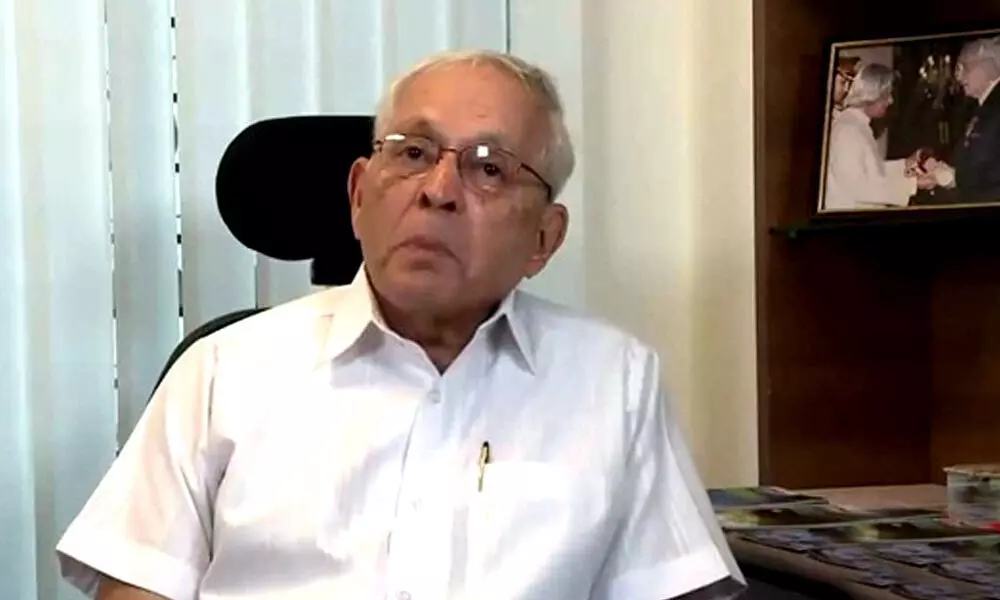Just In
Father of laparoscopic surgery in India pens memoir


Dr Tehemton Erach Udwadi (File/Photo)
Ensuring surgical care for everyone may be a utopian dream that may take years or even decades, but when the fundamental right to all healthcare is met, India will be a fair, just and better country, says Dr Tehemton Erach Udwadi, considered as the father of laparoscopic surgery in India.
New Delhi: Ensuring surgical care for everyone may be a utopian dream that may take years or even decades, but when the fundamental right to all healthcare is met, India will be a fair, just and better country, says Dr Tehemton Erach Udwadi, considered as the father of laparoscopic surgery in India.
The octogenarian doctor, awarded Padma Bhushan, Padma Shri and OBE, feels that there is a need to make sure that the country has a permanent solution to surgical healthcare and that permanent solution is to take healthcare where it is needed and where there is none - in rural India. "Surgical care for the poor is an uphill and herculean task and yet, a task worthy of every ounce of our collective effort and energy. It is vital that every government source, be it the Centre or the state, the private sector, every association and all doctors, from professors to village doctors, pool their concerns in this effort," he says. "A sincere effort and success in this cause would, by far, be the greatest triumph and the ultimate success story in the history of surgery so as to ensure surgical care for all.
This utopian dream may take years or even decades, but when the fundamental right to surgical healthcare and to all healthcare is met, India will be a fair, just and better country," he writes in his just-released memoir "More than Just Surgery: Life lessons beyond the OT". According to Udwadi, the current COVID-19 pandemic has changed the world forever. "Lack of surgical care accounts for over 2 per cent of the GDP each year. Till last year, health was not a vote bank. Over 70 years and more, each annual budget allocated less than 1 per cent of the GDP for healthcare! Thanks to the pandemic, every government will realise that health may henceforth become the biggest vote bank, for it goes beyond caste, religion, farmers and waivers - it affects every single Indian," he says. Udwadi rues that unlike before, the patient now often views the surgeon with mistrust and apprehension, even fear.
"And not always without reason. If we have any hope of restoring the relationship of complete trust that existed earlier, we should return to talking with, listening to, and touching and feeling the patient with sincere empathy and concern, regardless of their socio-economic background," he writes. He also feels Indian surgery is a two-faced enigma, living in a world of make-believe. "Surgery, as done in the major hospitals of urban India, is the reason why Indian doctors can hold their heads up with pride and say that we are just as good and getting better. This is the face of Indian surgery that the media, healthcare providers, government and medical industry project and promote. Nothing could be further from the truth. "The other face of Indian surgery is hidden, unseen, unheard and unknown. City surgeons are so involved in their work, progress and recognition that, over the years, they have become unmindful, uncaring and unaware that there is any other surgical world in India except for their own," he argues.
In the book, published by Penguin Random House, Udwadi also has a number of suggestions for doctors, particularly surgeons. A city surgeon who worked for over 60 years in several Mumbai hospitals, he says after "studying my own surgery, seeing my peers and seeing the quality of excellent surgeons in India and overseas", he has come to the conclusion that there are only five essential requirements to make a good surgeon - honesty, humility, empathy, passion and leadership. "A good surgeon is god's gift to the patient," he says. "Every surgeon, without exception, should be humble because we are repeatedly given reasons to be so. No surgeon is free of making mistakes and every mistake is a call for humility," Udwadi writes.
However, he says humility is hard for some surgeons to accept and the near holy reverence given to them, coupled with their own personal assessment of their superhuman prowess, endorses hubris and suppresses humility. He is also of the opinion that if any surgeon says they don't make mistakes, they have not done enough surgery or are losing their memory. "And every mistake is an opportunity. If they accept their blunder and realise what caused it, and put the entire episode into memory for future reference, it will not be repeated. In a sticky surgical situation, recalling your past missteps is key to the success of the procedure," Udwadi writes.

© 2024 Hyderabad Media House Limited/The Hans India. All rights reserved. Powered by hocalwire.com






